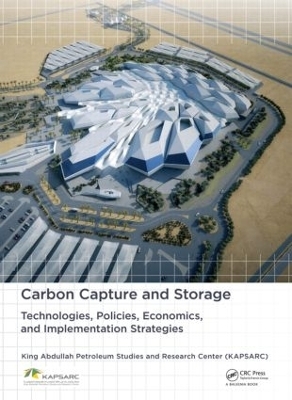
Carbon Capture and Storage
CRC Press (Verlag)
978-0-415-62084-0 (ISBN)
- Titel z.Zt. nicht lieferbar
- Versandkostenfrei innerhalb Deutschlands
- Auch auf Rechnung
- Verfügbarkeit in der Filiale vor Ort prüfen
- Artikel merken
The book is divided into three parts. The first part helps clarify the global context in which greenhouse gas (GHG) emissions can be analyzed, highlights the importance of fossil-fuel producing and consuming nations in positively driving clean fossil-fuel usage, and discusses the applicability of this technology on a global and regional level in a timely yet responsible manner. The second part provides a comprehensive overview of present and future technologies for the three elements of the CCS chain: CO2 capture, transport, and geological storage. The third part addresses the key drivers for CCS deployment worldwide. It provides analysis and assessment of the economic, regulatory, social, and environmental aspects associated with CCS development and deployment on a global scale. It offers a somewhat different perspective on CCS deployment by highlighting the environmental and socio-economic costs and benefits of CCS solutions compared to alternatives.
The book concludes with potential options and guidelines for sustainable and responsible CCS scale-up as a way to address prevailing global energy, environment, and climate concerns.
Saud M. Al-Fattah is Director of Global Energy Markets and Economics Research at the King Abdullah Petroleum Studies and Research Center. Saud has more than 25 years of experience with Saudi Aramco working in several petroleum engineering departments including reservoir management, oil and gas reserves assessment and fields’ development studies, reservoir simulation and reservoir engineering systems. His areas of specialty include: reservoir management, energy markets and economics, artificial intelligence, and strategic management. Saud has a U.S. patent, published several technical papers in peer-reviewed journals, and authored and co-authored three books: "Innovative Methods for Analyzing and Forecasting World Gas Supply," "Artificial Intelligence and Data Mining Applications in the E&P Industry," and "Carbon Capture and Storage: Technologies, Policies, Economics, and Implementation Strategies". He is an active member of the Society of Petroleum Engineers (SPE), the International Association for Energy Economics (IAEE), and the European Association of Geoscientists & Engineers (EAGE). He is also a member of the SPE Artificial Intelligence & Petroleum Analytics Subcommittee. Saud is a technical editor for the SPE Reservoir Evaluation & Engineering Journal, Natural Gas Science and Engineering Journal, and several other industry publications. He held the positions of vice chairman of the 2006 SPE Saudi Arabia Annual Technical Symposium, and chairman of the 2007 SPE Saudi Arabia Annual Technical Symposium. He earned his Ph.D. with distinction from Texas A&M University, and M.S. and B.S. degrees with honors from King Fahd University of Petroleum and Minerals (KFUPM), all in petroleum engineering. Murad Barghouty is Director of Energy and Environmental Technology Research at the King Abdullah Petroleum Studies and Research Center (KAPSARC). He has 24 years of experience in Saudi Aramco encompassing assignments in reservoir management, reservoir simulation, reservoir characterization, and production operations. Murad graduated in 1987 from Marietta College, Ohio, U.S., with a B.S. in Petroleum Engineering. Bashir Dabbousi is the Interim Vice President of Research at the King Abdullah Petroleum Studies and Research Center (KAPSARC). Prior to joining KAPSARC, he was Coordinator of the R&D Division in the Research & Development Center, where he spent most of his career with Saudi Aramco. He has coauthored 10 U.S. patents, 3 U.S. patent applications and 25 publications in peer reviewed technical journals in the research areas of nanostructured light emitting materials (5 patents licensed to two U.S. companies), liquid petroleum fuels, crude and products desulfurization and oil to hydrogen. During 2005-2006, he was an Academic Visitor in the Department of Chemical Engineering and Chemical Technology at Imperial College London. Bashir received a B.S. degree in Chemistry summa cum laude from the University of California, Berkeley and a Ph.D. in Physical Chemistry from the Massachusetts Institute of Technology (MIT). He also completed the Advanced Management and Leadership Program at Oxford University, Saïd Business School.
Foreword
|Part I: Why CCS?1 CCS in an global context
2 CCS deployment status, regional applicability, and stakeholders
Part II: Technical description and operability of the CCS chain3 CO2 Capture and separation
4 CO2 Transport systems
5 CO2 Geological storage
Part III: Deployment drivers6 CCS regulatory framework
7 Economics of the CCS chain
8 CCS quality standards – challenges to commercialization
9 Conclusion: A pragmatic way forward
| Verlagsort | London |
|---|---|
| Sprache | englisch |
| Maße | 174 x 246 mm |
| Gewicht | 960 g |
| Themenwelt | Naturwissenschaften ► Biologie ► Ökologie / Naturschutz |
| Naturwissenschaften ► Geowissenschaften ► Geologie | |
| Technik ► Umwelttechnik / Biotechnologie | |
| ISBN-10 | 0-415-62084-8 / 0415620848 |
| ISBN-13 | 978-0-415-62084-0 / 9780415620840 |
| Zustand | Neuware |
| Haben Sie eine Frage zum Produkt? |
aus dem Bereich


